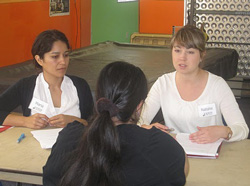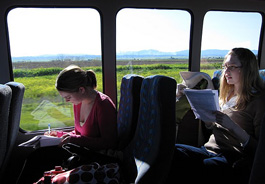California Bar Foundation awards
$221,000 in grants
The California Bar Foundation announced last month that it is awarding 16 grants totaling $221,000 to organizations providing legal services and education across the state. The awards focus on California’s rural areas, where legal services are limited and language access projects are in demand by multi-lingual residents.
“The California Bar Foundation has once again demonstrated its leadership in championing
full and equal access to justice for all Californians,” said bar President Bill Hebert. “These grant awards highlight the innovative ways in which many nonprofit organizations are working to close the enormous justice gap California faces.”
 |
At a Paso Robles clinic sponsored by OneJustice
and California Rural Legal Assistance,
Southwestern law students Maria Olaguez (L)
and Natalie Wright (R) listen to a client. |
The largest grant — $25,000 over two years — will go to the Public Interest Clearinghouse to fund the southern California expansion of the Justice Bus Project, which puts urban law school students together with rural clients. Since 2007, the project has worked with more than 290 law students from schools throughout the state who have helped some 900 clients and their families. Issues have included citizenship and naturalization in Bakersfield, help for seniors along the coast, family law and guardianship questions and seemingly ubiquitous foreclosure problems. Ten legal services organizations have set up clinics in 18 counties where they are supervised by a combination of local attorneys providing pro bono work and lawyers from legal services programs.
Julia Wilson, executive director of the Public Interest Clearinghouse, said it’s difficult to place a dollar value on the law students’ work, which sometimes brings services to a locale where nothing previously existed. For example, a group of Stanford students recently traveled to Mariposa, which falls under the aegis of Central Valley Legal Services but has no brick-and-mortar presence. “Basically, they provided services that didn’t exist at all one day earlier,” Wilson said.
 |
USF law students Andrea Goddard (L) and
Nora Devine (R) get ready to help low-income
pro se clients in Willows and Oroville. |
Although students carpool if they travel locally, those going on an overnight trip travel on a bus provided by a local company. “We really grappled with how to deal with the travel time,” Wilson said, explaining that the students receive training and do other prep work, such as interview techniques and issue-spotting, on the bus.
In some schools, the program is so attractive that an application process has been put in place. Although the Clearinghouse’s other programs focus on students planning to do public interest work, the bus project attracts a wider range of lawyers-to-be. Students already interested in public interest work report a renewed commitment while those who plan a more traditional legal career say they come away with a deeper commitment to pro bono work.
“Honestly, I believe this trip was the highlight of my last year in law school,” said a student from Southwestern Law School. “I can’t tell you how incredible it was to assist people who otherwise would have no place to go for legal help.”
A grandparent who wanted to become the legal guardian of a grandchild turned to a clinic for help and was relieved to learn how to simplify the process. “Without this, we would be all stressed out,” she said. Another client called the clinic “a godsend.”
The project received money for a pilot program with law schools and rural legal services organizations in southern California last year and the new grant money will allow it to expand its work. It also continues its northern California work.
The foundation also awarded five grants of $20,000 each. One goes to the Asian Pacific American Legal Center
(APALC) to support its Self-Help Family Workshops that provide information about dissolution, domestic violence and other legal matters to members of Orange County’s Vietnamese and other Asian communities. Many of the clients speak limited
English. The central valley’s Immigrant Legal
Resource Center also will receive $20,000 that will help fund six centers that are part of its remote representation project. Clients receive advice about immigration issues and domestic and other violence. The Legal Aid of Sonoma REACH project, the recipient of a $10,000 grant, will bring services to two underserved groups in the county — low-income Spanish-speaking immigrants and Native Americans.
Since the foundation began its grants program in 1991, it has distributed more than $5.4 million for law-related access to justice,
education and outreach projects to community organizations, legal aid
agencies, courts, bar associations and the State Bar.